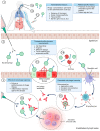Bacteriophages as Potential Clinical Immune Modulators
- PMID: 37764066
- PMCID: PMC10535580
- DOI: 10.3390/microorganisms11092222
Bacteriophages as Potential Clinical Immune Modulators
Abstract
Bacteriophages (phages for short) are bacteria-specific viruses that have been drawing attention when it comes to countering the ever-growing antibiotic bacterial resistance, and are being seen as one of the most promising technologies against multi-antibiotic-resistant bacteria. Although bacteriophages are commonly regarded only as anti-bacterial objects unable to directly interact with eukaryotic cell metabolism, an increasing quantity of evidence has indicated that bacteriophages can directly affect cells bacteria in both in vitro and in vivo applications, influencing the behavior of tissues and immune systems. In sight of this new range of applications, several authors have expressed enthusiasm in phage therapy as direct modulators of eukaryotic cells for clinical usage, highlighting the need for further investigations covering the pharmacology of these new "eukaryotic-viruses", as even harmful interactions with eukaryotic cells were detected after phage therapy. The present review aims to cover and highlight mechanisms through which bacteriophages may interact with immune cells, analyzing potential clinical applications and obstacles presented in the use of bacteriophages as anti-inflammatory tools.
Keywords: anti-inflammatory; bacteriophages; immune modulation; immunology; inflammation.
Conflict of interest statement
The authors declare no conflict of interest.
Figures


References
Publication types
LinkOut - more resources
Full Text Sources

